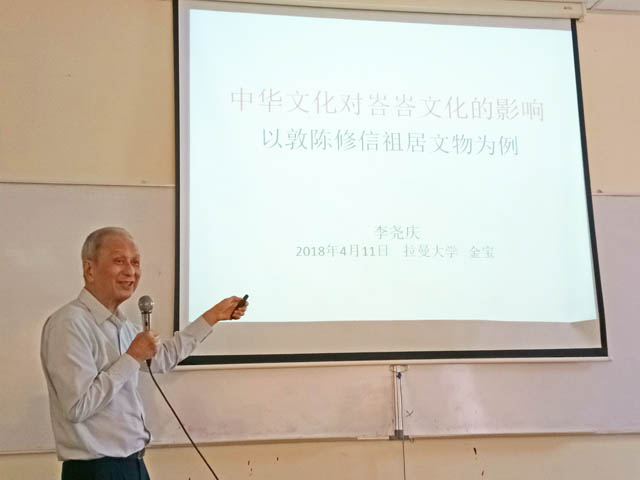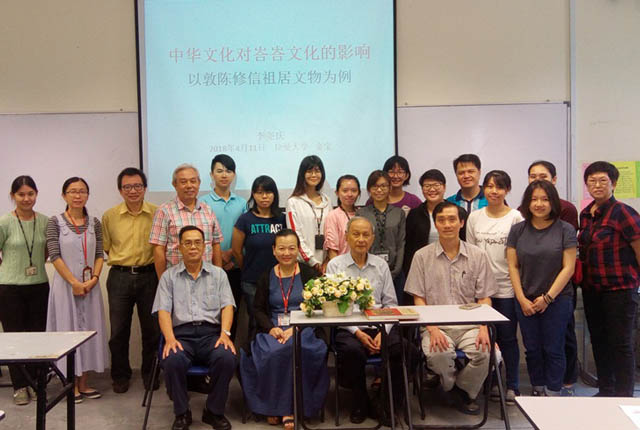
 Datuk
Seri Lee delivering his talk
Datuk
Seri Lee delivering his talk
The Institute of Chinese Studies (ICS) organised a talk titled “The Influence of Chinese Culture on Baba and Nyonya Culture – take Tun Tan Siew Sin’s ancestral home and artefacts as an example” at Kampar Campus on 11 April 2018.
The talk was conducted by Datuk Seri Dr Lee Yow Ching who was the Former Penang Water Supply Corporation Sdn Bhd (PBAPP) General Manager. Dedicated to the development and management of water supply in Penang for more than 40 years, Datuk Seri Lee graduated with a degree in Civil Engineering from the University of New South Wales, Australia and Doctor of Business Administration from the University of South Australia. He is also a registered Professional Civil Engineer with the Board of Engineers, Malaysia and a British Chartered Engineer. Today, he still actively participates in social activities, particularly in the Chinese cultural activities. To date, Datuk Seri Lee has held important positions in various Chinese associations, such as Deputy Head of Literary Group of Penang Chinese Town Hall, Deputy President of Penang Sun Yat Sen Association, Head of Poetry Group of Penang Art Society and Advisor of Penang He-Shan Poetry Association.
Present at the talk were ICS Deputy Dean for Student Development and Industrial Training Dr Ling Liong Ngo, Department of Chinese Studies (Kampar Campus) Head Toh Teong Chuan, Centre for Chinese Studies Chinese Art Research Unit Head Dr Lim Chee Men and lecturers.
Datuk Seri Lee’s publication titled “Within the Walls of Tun Tan Siew Sin’s Ancestral Home (《环壁生辉:敦陈修信祖居文物巡览》)” was co-authored by Tun Tan’s daughter Datin Paduka Tan Siok Choo in both Chinese and English languages. The book showcased the artefacts, cartouches, painting, calligraphy, embroideries, lanterns, wooden carvings, figurines and photographs found in Tun Tan’s ancestral home. He used the book as the reference point for his talk. He then elaborated further about Tun Tan and the infusion of Baba’s culture in his family.
He said, “Although Chinese culture and cultural relics studies are not my areas of studies, those are my personal interests. I am glad to be able to share and exchange knowledge with the teachers and students present here.” The session saw him explaining the Chinese cultural artefacts found in Tun Tan’s ancestral home. He also highlighted the culture and lifestyle of the Malaccan Baba family which was deeply influenced by the Chinese culture. Most of the words found in the cartouches in Tun Tan’s ancestral home were from the ancient Chinese Classic, such as “The Book of Songs (《诗经》)”, “Book of Rites (《礼记》)”, “The Mencius (《孟子》)”, “The Analects of Confucius (《论语》)” and others.
Besides that, the ancestral tablets, painting of Guan Yu, the classic quotations of Confucius and Mencius, famous paintings, paintings inscriptions, couplets and proverbs also reflected the spiritual values of Confucianism, such as righteousness, integrity, loyalty, mercy and compassion. “Tun Tan’s family has always persisted in practising traditional Confucianism concepts. The ancestral remembrance ceremony will be held regularly at the ‘Hall of Filial Remembrance (孝思堂)’ in the ancestral home. This is because the Baba’s family particularly concerns on the ancestral remembrance ceremony,” he said.
The photographs found in Tun Tan’s ancestral home played as a timeline for the family. It recorded the changes that took place in Baba’s family, Tun Tan’s family, social environment and the political development of our country in early days. He revealed, “The Baba ethnic has made a great contribution to the political development in Malaysia and Singapore. Tun Tan Siew Sin and his father, Tun Tan Cheng Lock, were the representatives among them.”
He concluded, “The Baba ethnic is committed to the inheritance of Chinese culture. Meanwhile, it also welcomes the integration of Chinese and Western cultures. Malaysia is a multi-racial country, as a researcher, I believe we should strive to deepen the cultural exchanges and research of all ethnic groups and promote the harmonious culture. ”
 Front
row, second from right: Datuk Seri Lee and the audience
Front
row, second from right: Datuk Seri Lee and the audience
 Datuk
Seri Lee sharing some of the interesting findings
Datuk
Seri Lee sharing some of the interesting findings
© 2019 UNIVERSITI TUNKU ABDUL RAHMAN DU012(A).
Wholly owned by UTAR Education Foundation Co. No. 578227-M LEGAL STATEMENT TERM OF USAGE PRIVACY NOTICE